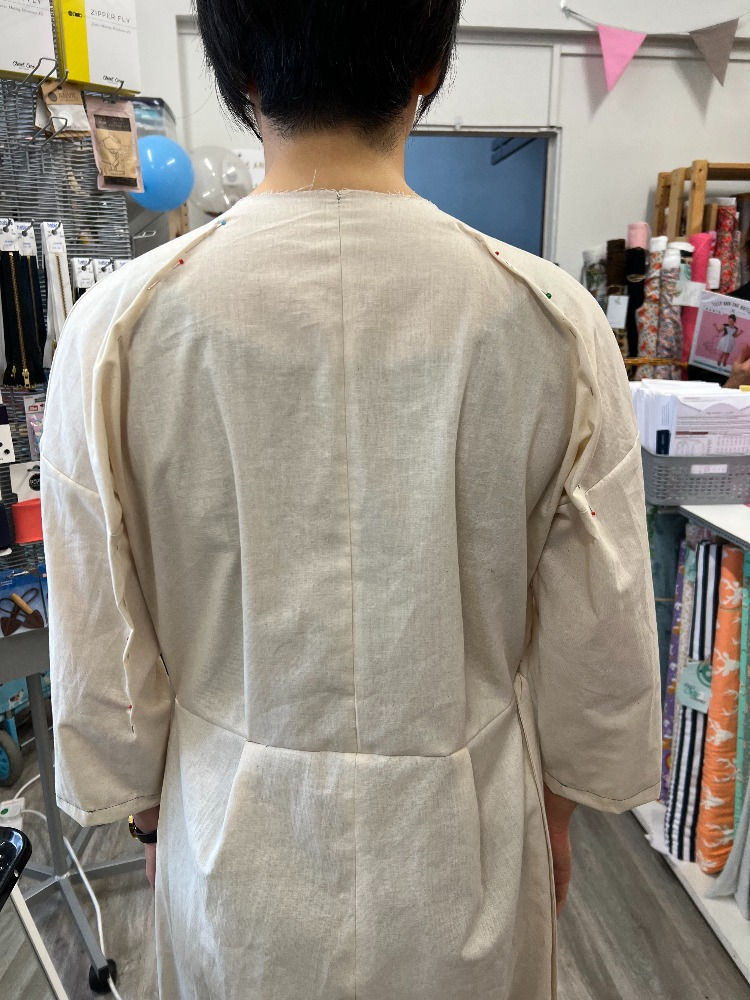Fitting the Zadie Jumpsuit
- MingMakes

- Jun 23, 2023
- 7 min read
Updated: Feb 16, 2024
Fitting patterns is a process that often takes me weeks, and so the point at which I stop is usually when I think it’s good enough, rather than feeling I’ve achieved a really good fit. I therefore immediately signed up to the weekend workshop on offer with Serefina Taylor at Bristol sewing store Like Sew Amazing to fit a jumpsuit.
You can see my review of the pattern itself here, plus a subsequent one I made in velvet with long gathered sleeves, and read a review of my workshop experience here. It was brilliant - I learnt a lot about my own particular fitting issues, and came away with a pattern I could sew up with confidence. I did end up making a couple of adjustments later on, partly for preference of a tighter fit and to change the fit of the trousers.
Sizing
My measurements matched size 8 at the bust, 12 at the waist and 10 at the hips. There was a decent amount of ease at the waist so I went with size 10 here to make things a little easier.
Pattern adjustments
With Fina’s guidance, I then made some adjustments to the paper pattern based on our measurements, comparing these to that of the pattern. Seam lines were drawn on the pattern to help with this, since the measurements taken on ourselves would not include these. Our adjustments were largely based on differences in the vertical height of the bodice (nape-to-back waist and to front waist), crotch length and length of the trousers. These identified the following:
1. My nape-to-back waist measurement was 1cm longer than the pattern
2. My nape-to-front waist measurement was 2cm shorter than the pattern
3. My crotch length was 10cm shorter than the pattern
4. My preferred length was 5.5cm shorter than the pattern (I am 5"4' tall)
5. If I wanted the trousers at floor-length, I could add 19cm
The fact that the front and back bodice pieces had a discrepancy (i.e. I was longer in the back and shorter in the front) meant that the balance was off, and so Fina advised moving the shoulder seam rather than using the lengthen/shorten lines.
For each of the above, I did the following adjustments:
1. My nape-to-back waist measurement was 1cm longer than the pattern. I added 1cm to the back shoulder seam. This took care of the additional 1cm needed and moved the shoulder seam forwards to where it should be.
2. My nape-to-front waist measurement was 2cm shorter than the pattern. I removed 1cm from the front shoulder seam. This was to match the moved shoulder seam on the back piece. This still left me with 1cm to remove from the height of the front piece but this was small enough that Fina was happy to go to the toile without further adjustment.
3. My crotch length was 10cm shorter than the pattern. Since the fit of the trousers is like a loose pair of culottes, the additional crotch length shouldn’t be an issue so we left it as is.
4. My preferred length was 5.5cm shorter than the pattern
I drew this line on the pattern rather than shortening it, since I also wanted a floor length version.
5. If I wanted the trousers at floor-length, I could add 19cm Fina pointed out that as well as adding to the trouser length, I would need to widen them at the hem so they would fall over my shoes properly. If I had continued the width from the cropped hem, it might have looked too narrow.
First toile
When sewing the toile, Fina advised sewing the darts on the trousers, then pinning the bodice and darts to match to ensure everything lined up. I was pretty impressed with the fit of the toile, and when looking at it from the front I thought that it didn’t need anything more.

On the back I had some excess around the upper back and down the upper arm. This is an issue I have often had on other garments so it was very helpful to see how Fina would tackle this. She pinned out two options:
Pinning width out of the back piece, no adjustment to the sleeve
Pinning down the back from the shoulder down the back of the sleeve

Although I thought Option 1 initially looked better because of the more fitted back, Fina pointed out that it still left a lot of excess fabric in the back of the sleeve. It also effectively removed the waist pleat and so we agreed with Option 2. She pinned out both sides and we decided to go with this.

Back adjustment
The photo below shows the blue dotted lines of what Fina pinned out, it was essentially a large dart going across the back of the shoulder and arm. This was very interesting to see as I have often struggled with fitting this area, thinking I had too much width in the back or a sloping shoulder. For this garment, I essentially needed a back armhole dart.

The excess pinned out was 5cm. I straightened the pinned lines on the back piece to make the dart, cut along one side and overlapped to remove this amount, smoothing the armhole.

Sleeve adjustment
Fina then guided me to do the sleeve adjustment to match, taking it off the underarm seam. The dart is the blue dotted line below, the equivalent of which I cut off the left side of the pattern piece, going to nothing at the sleeve hem. I then trued the pattern around the entire armhole.

I adjusted the pattern for the pinned hem for both full length and cropped, making sure I added the seam allowance back.
This was definitely one of my more positive fitting experiences. Making a couple of adjustments before making the toile seemed to make quite a difference, and there were minimal adjustments required afterwards. If I could manage only one toile in each project and be more confident of the final garment, I’d be very happy. It has certainly made me think about my ‘usual’ fitting adjustments differently, to make considerations about moving the shoulder seam forwards and whether I need to remove anything from the back armhole and sleeve.
Further fitting
I assessed the toile again before starting to make it, since I was using some very special Japanese fabric gifted by my sister from the Japan Crafts store. I could also see this as a pattern I'd make multiple times, so I wanted to be sure the fit was as good as I could make it.

Grading down trouser size
I decided that I didn't want quite so much fabric for the trousers and so sized down from 10 to 8, grading down to 8 at the waist of the bodice piece so it would match.
Back rise adjustment
I noticed that the trouser side seams were pulling forwards, with my calves touching the back of the trousers. This was causing a slight drag line where my lower leg was pushing the trouser leg back. During the workshop I was working on a full length trouser version falling over my feet so this wasn't noticeable.
When I pulled up the centre back seam just below the waist seam, this made it hang straighter. I basted a horizontal wedge of 4 cm in total to see how this would look. I had tried it at the lengthen/shorten rise line but I didn't think it looked as good so I did it higher up, about 10cm below the waist seam. (I had tried some other adjustments in between but returned to my original toile pattern, and so the fabric is different)
This looked better in that I was no longer getting the drag lines, but looked like it could do with a touch more so I did the pattern adjustment for 5cm. This took 5cm out of the crotch length but it was already very long so I didn't do any further adjustments, checking I could still sit down and bend over with ease. The crotch point seemed quite far forwards on me, so this adjustment helped with this too.
To adjust the pattern piece I cut a horizontal line about 10cm below the waistline either side of the side seam line, leaving a small hinge. (Apologies for the busy-looking pattern piece, I have a washi tape obsession!)

I then overlapped the pieces by 2.5cm at the centre back seam giving a total shortening of 5cm here, but no change in length at the side seam.

I didn't do any adjustment to the pocket, but will check it when sewing it up.
Sleeve length
After assessing sleeve length on my toile, I decided to shorten it by 8cm by drawing a horizontal line across the pattern piece about half way down, perpendicular to the grainline. I then overlapped the piece and smoothed the edges.

Inseams twisting forwards
Once finished, I realised the inseams were twisting slightly forwards. Having looked at The Fitting Book by Gina Renee Dunham, this may be caused by the trouser part of the pattern not being being balanced so I will look at this when making this again. My adjustment to the back crotch may have caused an issue.
Find me on Instagram, Facebook, YouTube, Bloglovin' or scroll to the bottom to subscribe to my monthly newsletter.
Links
I have no affiliations, I'm just a keen buyer and user. A UK supplier may be linked, please try to source items from your favourite independent stores.
Serefina Taylor / FinaMakes on Instagram, YouTube, website (under construction at time of writing but is worth signing up to her newsletter)











































































Thanks for this! I have similar fit issues with my toile and this really helped!!!